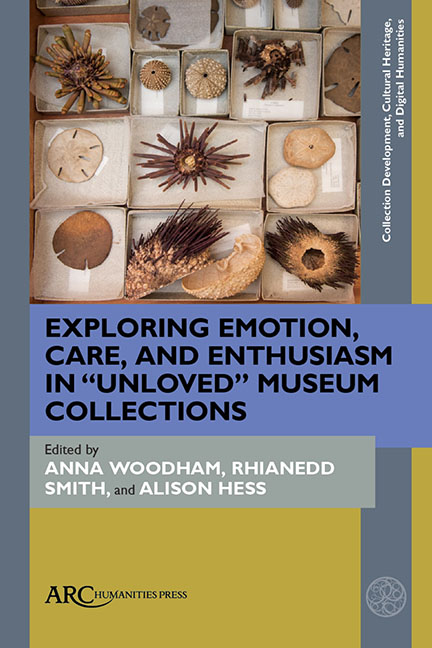Chapter 6 - Getting to Grips with Medical Handling Collections: Medical Memories, Specialist Knowledge, and Community Engagement around “Unloved” Objects
Published online by Cambridge University Press: 20 November 2020
Summary
RESEARCH INTO MEDICAL collections demonstrates that numerous universities and hospitals collected in order to preserve the history of their profession and to train new generations. Unlike some of the more esoteric subjects in this book, medical memories are shared by the majority of the population. For many, these memories tend to take a particular form associated with trauma and sickness. While positive associations towards medical collections will of course also be held by individuals, often the memories are more difficult. The emotive nature of many medical collections adds a unique layer of meaning to these objects, offering enhanced potential for them to be considered as “unloved.” In this medical museum context, the term “unloved” is characterized by collections that not only have difficult associations but also lack aesthetic appeal and personalization. However, for professionals who worked with medical objects and medicalized bodies for decades, the emotional resonance may be very different.
My perspective on this subject is that of a museum practitioner who has observed many interactions between visitors and medical collections. I come to the issue of “care” for collections as someone interested in exploring the humanity within medical collections. This revaluing and re-evaluation of medical collections is becoming a common element of curatorial practice. Hence, over time, medical curation has become less about technically cataloguing specimens and soulless equipment and more about understanding how medical objects can become objects of universal enquiry and shared experience. Ultimately this helps us to understand what it means to be human. This subject follows wider shifts in the medical profession towards greater acknowledgement of emotions in medical work, both from the practitioner and patient perspectives, and it is a subject I will return to at the end of the discussion.
This chapter focuses on the medical handling collection used at The Infirmary, Worcester, a collection comprised of seemingly “unloved” objects. Two specific themes will be drawn out in the discussions: the contribution that former medical and healthcare professionals, acting as “specialist volunteers,” make to reviving and engaging others with medical collections and, second, the role of collaborative community-orientated projects as sites for the reinvigoration of these collections. In other chapters in this volume (see Smith, Hess, and Woodham and Kelleher), authors discuss how the skills and knowledge of retired professionals who are also collections enthusiasts might breathe life into stagnant objects.
- Type
- Chapter
- Information
- Publisher: Amsterdam University PressPrint publication year: 2020



